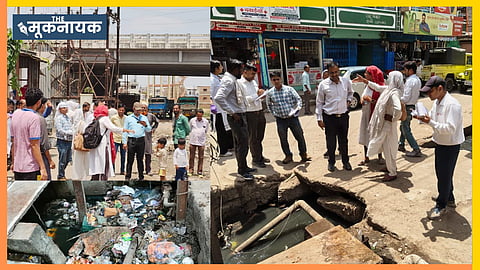
Bhopal- "If we had known earlier that we were drinking poison, perhaps we would have survived," Sabida Bi from Annu Nagar says with tears in her eyes. She explains that she drank water from a tube well for years—now, she suffers from a severe kidney disease.
"There’s hardly any house in our locality where someone isn’t sick," she says. "Many have died of cancer, while others have succumbed to kidney disease. All this is because of the same poisonous water, the truth of which we came to know very late." Residents of Bhopal’s polluted neighborhoods shared their suffering in a conversation with The Mooknayak.
Four decades have passed since the Union Carbide gas tragedy, but its impact can still be clearly seen in many neighborhoods of Bhopal. Even today, people in about 42 localities near the factory are forced to drink toxic water. The groundwater in these areas remains contaminated with poisonous chemicals from Carbide. Under the supervision of the Supreme Court, a new inspection campaign has been initiated in these areas by the monitoring committee formed following the court’s August 30, 2018, order.
Inspections of 19 localities had already been completed over the past four days. On Tuesday, the inspection team checked water quality in the remaining 23 localities. This campaign was conducted in and around the Union Carbide factory in JP Nagar and its affected areas. The inspection also included areas like DIG Bangla. Officials from the district administration, environment department, and water institutions, along with representatives from gas victim organizations, were present during the inspection.
The inspection continued until Tuesday evening, during which the team collected groundwater samples from various locations. Gas victim organizations also submitted photos and video evidence of polluted water, lack of sewage systems, and unhygienic conditions to the inspection team. Along with this, a detailed report was presented, highlighting the water situation and lack of basic facilities in the 42 localities.
According to the report, clean water is still unavailable in nearly 70% of these 42 localities. Many colonies still do not have piped water supply, forcing people to rely on tankers or hand pumps—most of which provide toxic and salty water.
Rachna Dhingra, coordinator of Bhopal Group for Information and Action, told The Mooknayak that heavy metals (such as mercury, arsenic), pesticides, and Persistent Organic Pollutants (POPs) had already been detected in the groundwater of 14 localities around the Union Carbide factory. A 2012 report by the Indian Institute of Toxicological Research (IITR) found poison in the water of 14 localities, as well as 8 additional settlements.
A new report in 2018 confirmed water pollution in 20 more localities. Following this, the Supreme Court issued clear orders:
Piped clean water supply to all affected areas.
Sewage facilities to be provided.
Water quality reports to be made public every three months.
Rachna Dhingra stated that many areas, including Foota Makbara, Kainchi Chhola, and Kalyan Nagar, still do not have tap connections. Families in these localities are still forced to use dirty and poisonous water, despite the court’s explicit directive that providing clean water to all affected areas is the state government’s responsibility.
Due to poisoned groundwater, skin diseases, stomach ailments, miscarriages, asthma, and cancer are being observed among children and women in these neighborhoods. Gas victim organizations say this is the result of government and administrative negligence, leaving people deprived of basic rights even after so many years.
During the inspection, organizations presented the following key demands to the monitoring committee:
Immediate piped clean water supply to all 42 localities.
Priority tap connections for areas still without them.
Construction of sewage lines to prevent further contamination of water sources.
Public disclosure of groundwater test reports every three months.
The government must treat this not as routine administrative work but as a humanitarian disaster and provide immediate solutions.
The Supreme Court-monitored committee will submit a report to the central and state governments after the inspection. This report will evaluate how seriously the court’s orders have been followed and what further measures are needed. The court’s next steps will be decided based on this report
You can also join our WhatsApp group to get premium and selected news of The Mooknayak on WhatsApp. Click here to join the WhatsApp group.